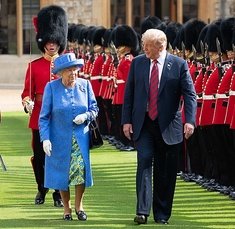|
Question or Term
|
Answer
|
|
Those that often form in large broad-church parties like the Democrats, Republicans, Conservatives, and Labour, due to them being less ideologically pure
|
Party Factions
|
|
Those parties the similarities between which are that they both stress minority and workers' rights, favour environmental protection, promote more equality of outcome, and support higher progressive taxes and government spending on public services and welfare, alphabetically
|
Democrats and Labour
|
|
That country the culture of which in the 18th century was based on having broken free of an autocratic monarchy and unrepresentative parliament, and that was largely accepting of slavery, fearful of state-organised religion, and deferential to individual liberties
|
United States of America
|
|
That which is regulated in the US in that FECA introduced maximum donations with loopholes closed by the Bipartisan Campaign Reform Act many regulations of which were overturned by Citizens United v FEC, allowing for the formation of Super PACs which can make unregulated party donations
|
Party Finance
|
|
That approach to comparative politics which when used to compare executives mostly concerns personal popularity and attributes of the premier and senior executive officials
|
Rational Approach
|
|
That US body the defining powers of which are that it is the final court of appeal for federal and state supreme court cases, rules on the constitutionality of federal and state law and actions of federal and state executives, interprets the Constitution, and is subject to no higher authority
|
Supreme Court
|
|
That the weaknesses of which are that executive branch officials can appear only before committees, the President very rarely givens direct evidence, it shares legislative power with the House, pays less consideration to constituents due to 6 year election cycles, and experiences gridlock, partisanship, and divided government
|
Senate
|
|
That body in the US which is differentiated from its UK counterpart in that members; cannot be part of another branch of government, require Senate confirmation, meet irregularly at the whim of the President to whom they are subordinate, are mostly policy-specialists and strangers to the President whom they rarely see, and there is not collective responsibility
|
Cabinet
|
|
That which the President has more of than the Prime Minister in that he is; directly elected and has constitutional authority over the executive branch, is unrestrained by Cabinet of party, and can use executive orders and executive agreements to largely circumvent checks and balances
|
Power
|
|
That the weaknesses of which are that it lacks a democratic mandate, its powers are mostly only ones of delay, it has a poor public image, the government often lacks a majority, and it contains Anglican Bishops
|
House of Lords
|
|
|
Question or Term
|
Answer
|
|
That party which has been divided into two factions, a democratic socialist wing led by Bernie Sanders, and a moderate wing led by Joe Biden though formally by Hillary Clinton
|
Democratic Party
|
|
That which is more prevalent in Congress than in Parliament in that Congress must approve judicial and executive appointments, must ratify treaties, can impeach and try federal officials, and at least formally has the power to declare war
|
Oversight
|
|
Those the aims and functions of which are to accentuate and extol certain policies, aspects of ideology, or party 'greats' (Thatcherites), to widen voter appeal and diversity by reflecting demographic, religious, or ideological groups within the party, to challenge the party establishment, and to support and encourage those of a similar mindset
|
Party Factions
|
|
That increasingly asserted power of the UK courts that has seen many pressure groups start to more heavily lobby the judiciary
|
Judicial Review
|
|
That the strengths of which are that it is the supreme house, the executive is drawn from and accountable to it, it has influential select committees, and can question and debate ministers directly
|
House of Commons
|
|
That which the Prime Minister has more of than the President in that they have significant influence over the legislature in the form of patronage, whips, and party loyalty, often manage to act free of Cabinet restraint, do not face such strong constitutional checks from the Supreme Court, face no term limits, and require no approval for executive appointments
|
Power
|
|
Those two roles regarding law held in the UK by three officials none of whom are part of the judiciary, all instead being part of the executive and legislature, namely; the dual office of Lord Chancellor and Secretary of State for Justice, the Attorney General, and their subordinate the Solicitor General, alphabetically
|
Advise and Oversight
|
|
Those the benefit of which are that they provide and propagate new ideas and policies while also helping to keep member and voters within the party (who otherwise might leave) by acting as a potential future leadership
|
Party Factions
|
|
That UK party the origins and ideology of which are differentiated from what is most often considered its US counterpart in that it formed out of the trade union movement and has been socialist for most of its existence
|
Labour Party
|
|
That which it is often said Parliament does concerning legislation due to much greater executive power and party unity, in contrast to Congress truly passing it
|
Legitimation
|
|

